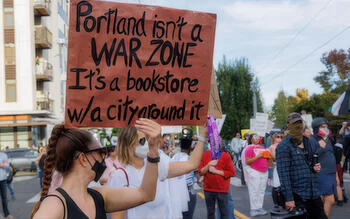
As recently as a decade ago, Portland was widely seen as a model American city, a European wannabe built around dense apartments, mass transit and every conceivable form of political correctness. Now it is the latest place to be invaded by Donald Trump’s National Guard, and of course the political establishment is screaming its head off.
Yet whatever you think of Trump’s over-the-top move, Portland probably had it coming. No city better epitomises the increasingly radical spirit of the progressive Left. This has devastated its once vibrant downtown; liberal long-time Congressman for the area, Earl Blumenauer, has suggested that parts of it look “like Dresden in World War II”. In 2023, downtown Portland suffered the highest office vacancy rate in the nation.
This year that honour goes to Seattle, which suffers from many of the same pathologies. These cities are increasingly out of sync with the more conservative mood in the country.
During the 2020 Black Lives Matter riots, parts of Seattle shut down for weeks and spawned something of a mini-Havana near its downtown. Even ardent Seattle boosters lament the large numbers of empty stores, business flight and stubbornly high office-vacancy rates, with valuations declining by as much as 40 per cent. Crime may be down, but it remains elevated.
Attempts to harass federal immigration agents (these are “sanctuary cities”) by Antifa activists are a key reason behind Trump’s moves in Portland and could also be employed in Seattle, another major Antifa centre. The ICE raids are fodder for violent groups like Antifa, deemed by the extremists as justification to attack law enforcement.
Despite its Marxist aura, Antifa is no workers’ organisation. It is largely a decentralised, web-oriented millennial movement wedded to a Bolshevik worldview that seeks no compromise with the “enemy”. In that, they are much like their Weimar German antecedents in the early 1930s (Antifaschistische Aktion), who attacked not just Nazis but also liberals and social democrats, branding their enemies “social fascists”.
Under the Biden regime, Antifa and its breed of violent radicals were rarely challenged. Even now, the centre-Left has seemed reluctant to denounce Antifa’s violent tactics and attacks on opponents. Some, like NPR political correspondent Mara Liasson, have appeared to compare Antifa with the soldiers who stormed the Normandy beaches to defeat the Nazis. Others have appeared to deny that the likes of Portland or Seattle have a problem. Just recently, New York Times veteran Nicholas Kristof blithely dismissed Trumpian assertions about Portland devolving into a crime-cursed dystopia, sneering that “‘hell’ does not serve Pinot Noir this good”.
To be sure, Trump’s typically hyperbolic move to name Antifa “terrorists” may be overkill and worthy of challenge. But the designation was embraced by those who have suffered their attacks, including the head of the Seattle police union.
Politically, one would expect that cities like Portland and Seattle, still reeling from the violence of 2020, would be hostile to those who coddle the perpetrators. But remarkably it appears that the far-Left is on the rise again in both places. In Portland, the Democratic Socialists of America are a rising force and now control at least three of the city’s 12 council seats, with much of the rest firmly, if less rabidly, on the Left.
The new race to run Seattle, a place which suffered some of the most destructive effects of the 2020’s “summer of love”, as its clueless then-mayor called it, appears likely to see the moderates elected in the aftermath of 2020 replaced with a new slate of far-Left politicians. Mayoral frontrunner Katie Wilson embraces a similar platform as New York’s Zohran Mamdani.
Demographics drive this seemingly irrational trend. Once attractive to middle class professionals, Portland and Seattle are now losing domestic migrants, both to other states and their far peripheries. Recent analysis of Census Bureau data has shown people shifting to smaller labour markets like Spokane, Centralia and Shelton in Washington, as well as Bend, Albany, and Grants Pass in Oregon.
Those left behind tend to be single, childless hipsters who stay in the Northwest for its remarkable natural attractions as well as ideological reasons. This constituency is roiling urban politics from Mandami’s New York to Minneapolis, Oakland and Los Angeles, where far-Left politics also appears to be gaining power.
The Left-ward march of Northwestern politics, unsurprisingly, is leaving these former boomtowns in poor economic condition. Portland has lost its drive to have a big tech presence and suffers from weak job growth. Longtime tech superstar Seattle over the last few years has seen its two dominant tech firms, Amazon and Microsoft, lay off some 46,000 workers. It is being overtaken in terms of growth by sunbelt cities like Austin, Nashville, Charleston and Dallas. The decline has forced the closures of hundreds of restaurants and shops.
To be sure, the Northwest maintains great assets, from its natural beauty and hydro-electric power to its strong engineering base. It has the ingredients for a future resurgence. But this is not likely to happen until the crazed progressive tide is turned back.
This piece first appeared at: Telegraph.
Joel Kotkin is the author of The Coming of Neo-Feudalism: A Warning to the Global Middle Class. He is the Roger Hobbs Presidential Fellow in Urban Futures at Chapman University and and directs the Center for Demographics and Policy there. He is Senior Research Fellow at the Civitas Institute at the University of Texas in Austin. Learn more at joelkotkin.com and follow him on Twitter @joelkotkin.
Photo: A demonstrator holds a sign during protests against ICE in Portland Credit: John Rudoff.












